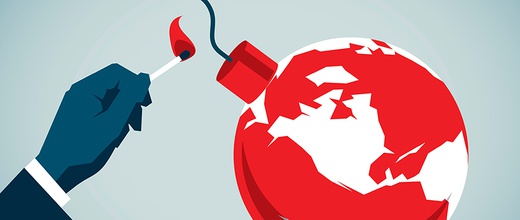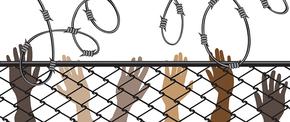The views expressed in our content reflect individual perspectives and do not represent the official views of the Baha'i Faith.
“What is the greatest need of the world of humanity?” a Baha’i asked Abdu’l-Baha in 1914, just as World War I broke out.
Speaking at the dawn of the deadliest conflict so far in human history, where 38 million people would die in the space of the next four years, Abdu’l-Baha said:
Today in the world of humanity the most important matter is the question of Universal Peace. The realization of this principle is the crying need of the time. People have become restive and discontented. The political world of every civilized nation has become a vast arena for the exhibition of militarism and the display of martial spirit. The minds of the statesmen and cabinet ministers, of every government, are chiefly occupied with the question of war, and the council chambers are resounding with the call to war.
Self-interest is at the bottom of every war. Greed, commerce, exploitation, the pushing further of the boundaries of the kingdom, colonization, the preservation of the treaty rights, the safeguarding of the lives and interests of the citizens, are a few of the many pretexts for going to war. And it has been proven by experience that the results of war are ruinous, both to the conquerors and the conquered. Countries are laid waste, public property trampled under foot, commerce is paralyzed, fields crimsoned with the innocent blood and the progress of the world retarded. How can a person rectify a wrong by committing a greater wrong, shedding the blood of his brothers? The major part of the revenue of every country is expended upon military preparations-infernal engines, the filling of arsenals with powder and shot, the construction of rapid firing guns, the building of fortifications and soldiers’ barracks and the annual maintenance of the army and navy. From the peasants upward every class of society is heavily taxed to feed this insatiable monster of war. The poor people have wrested from them all that they make with the sweat of their brows and the labour of their hands.
In reality war is continuous. The moral effect of the expenditures of these colossal sums of money upon military purposes is just as deteriorating as the actual war and its train of dreadful carnage and horrors. The ideal and moral forces of the contending parties become barbaric and bestial, the spiritual powers are stunted and the laws of divine civilization are disregarded. Such a financial drain ossifies the veins and muscles of the body politic, and congeals the delicate sensibilities of the spirit.
There is not the least doubt that the nation or government which puts forward an extraordinary effort in the promotion of universal peace will be encircled with divine confirmations, and will be the object of honour and respect amongst all the inhabitants of the earth. Such an action will be conducive to the prosperity and well being of mankind. Concerning this question of universal peace, fifty years ago his holiness Baha’u’llah wrote to all the sovereigns and monarchs of the world explaining in detail the benefits of peace and the evils, of bloodshed. Amongst other things he hath said: Originally mankind was one family, united and compact; later on the members of this happy family were divided and subdivided through ignorance and prejudice. Now the time has come again for their final unification. Universal peace will bring this long wished for consummation. – Star of the West, Volume 4, pp. 41-42.
In his remarkable answer to the question, Abdu’l-Baha made several fascinating and trenchant observations. First, he noted that “in reality war is continuous,” especially when “the major part of the revenue of every country is expended upon military preparations …”
Abdu’l-Baha made a prescient point. Today, scholars and historians refer to this kind of ongoing militaristic approach to nationalist conflict as “perpetual war” or “forever war.” Many insightful writers and military experts like Dexter Filkins, James Chace, David Keen, James Pinckney Harrison, Tran Van Don and Robert Fisk have all examined this “war is continuous” mentality, and described it as the driving factor in the war-torn Middle East, in Afghanistan, in Syria and in many other places around the world—as well as the major contributor to planetary tensions between the world’s most powerful nations.
So when the manufacturing bases of many of the world’s industrialized countries turn their energies to weapons and expend the bulk of their national budgets and resources on their militaries, just as Abdu’l-Baha predicted, it ultimately produces an inevitable war:
Consider now, that the most advanced and civilized countries of the world have been turned into arsenals of explosives, that the continents of the globe have been transformed into huge camps and battlefields, that the peoples of the world have formed themselves into armed nations, and that the governments of the world are vying with each other as to who will first step into the field of carnage and bloodshed, thus subjecting mankind to the utmost degree of affliction. – Abdu’l-Baha, Selections from the Writings of Abdu’l-Baha, p. 284.
The Baha’i teachings warn humanity and its leaders that waging perpetual war will lead to ruin, both for individuals and for nations. In any competition for supremacy in weapons, no amount of firepower can ever suffice. When one country attempts to simply stay ahead of others, each competitor spends enormous sums of money in a futile, fear-driven race to nowhere—usually ending up with the same “balance of power” as before. No one ever wins an arms race.
Baha’u’llah, in his tablets to the world’s kings and rulers, repeatedly warned us about arms races:
Compose your differences, and reduce your armaments, that the burden of your expenditures may be lightened, and that your minds and hearts may be tranquillized. Heal the dissensions that divide you, and ye will no longer be in need of any armaments except what the protection of your cities and territories demandeth. Fear ye God, and take heed not to outstrip the bounds of moderation, and be numbered among the extravagant.
We have learned that you are increasing your outlay every year, and are laying the burden thereof on your subjects. This, verily, is more than they can bear, and is a grievous injustice. Decide justly between men, and be ye the emblems of justice amongst them. This, if ye judge fairly, is the thing that behoveth you, and beseemeth your station. – Gleanings from the Writings of Baha’u’llah, pp. 250-251.

















Comments
Sign in or create an account
Continue with Facebookor